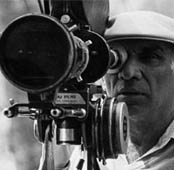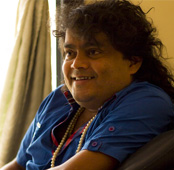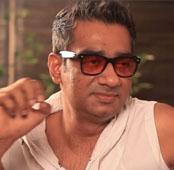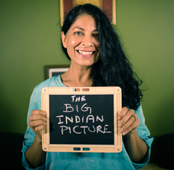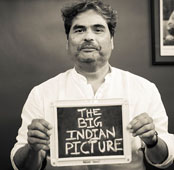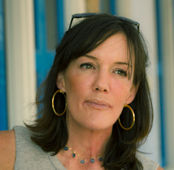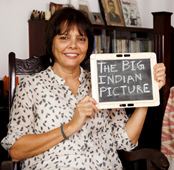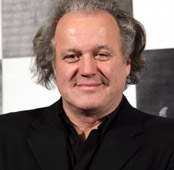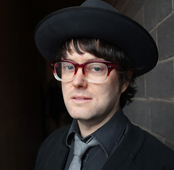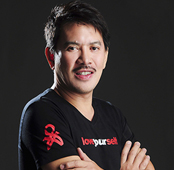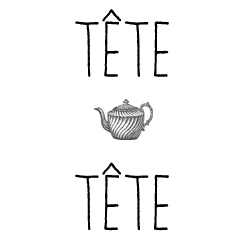
TBIP Tête-à-Tête is a series of in-depth and intimate interviews with film personalities who are critical to this era of filmmaking. It is an attempt to understand their body of work. And their minds. Because who they are intrigues us just as much as what they do. Because what they do is because of who they are. In certain cases, despite who they are. Because integral to the love of cinema is the love of cinema’s idols— the chosen few whose mystique remains intact despite the tabloids’ obsession with their lives.
Kalki Koechlin, 29, is an Indian actress of French descent who has portrayed a gamut of roles on screen. In life, she is seen as being one of the actors at the helm of what the media calls ‘New Bollywood’, or a Hindi cinema that is grittier and more real, and which deals with more challenging subjects than its mainstream counterpart, while still doing well financially. Also, Koechlin is married to a filmmaker who is seen as one of the driving forces behind this new kind of Indian movie— Anurag Kashyap.
Here she speaks of her relationship with cinema and theatre, a medium she performed in before she took to the movies. She tells us what she makes of the Hindi film industry and how it has evolved in recent years and traces her unlikely and wondrous personal journey.
Video Credits- Host Wardrobe Courtesy – ZARA
Read the transcript:
Pragya Tiwari: So I’m going to start with the one thing I find the most interesting about you that growing up, and you’ve spoken about this in a lot of interviews, there was no box for you. You always had to identify your identity so to speak, as a Tamil speaking girl at home, inwardly in India, but not outwardly, and vice versa, in France. Even though you’ve spoken a lot about it, I’ve often found myself wondering what it was really like. Teenage is tough enough, we all feel like we don’t belong, what was it like for you, was there angst to deal with?
Kalki Koechlin: I don’t know, I think you just deal with what’s in front of you. especially when you’re a kid. You think less about it when you’re a child, but I think the thing I found myself doing when I look back is that I would always try and fit in all the time. So I would always be these different avatars, I was never really myself. I was actually a very shy person, but outwardly I would put on this show of being very entertaining, clowning; you know I would make people laugh. That was my way of getting people to just get over me, not ask me too many questions, so that’s one kind of protective barrier I used to have. The other thing is obviously growing up, you know, on the one hand I was always made to feel different and special, because I’m white. So boys would hit on me or people would sell me drugs, because I’m white. There was a certain approachability that came with being this white girl, and at the same time I would retort in Tamil, and I would give it back to them and they would be like oh, no, no, you know, we can’t mess with her. It gave me almost a freedom to be able to shift between being this foreign looking girl who’s all naïve and doesn’t know what’s going on and then to being this girl who actually knows everything about what’s going on and what you’re saying about her behind her back, so it gave me perspective.
PT: Was belonging a big deal, was there a search for belonging ever?
KK: Of course, I still do. It’s the most frustrating thing for me to not belong.
PT: No, outside of your identity as a foreigner in India, in general as well, is that a big thing?
KK: Yes, I think so. Now not so much, in the sense that I think I’m much more confident about myself now than I was as a kid. But growing up it’s normal, you want to be part of the cool group, you want to be accepted for things and all of that.
PT: So you would say you don’t have a quest for home now?
KK: Home, no. I’ve made my own home, I’ve made my own space.
PT: Is it inside your head mostly or do you feel like you belong in Bombay now?
KK: It’s mostly inside my head, but it’s definitely a belonging in India, not definitely Bombay, because I have a love-hate relationship with this city.
PT: You feel like you’re passing through?
KK: I feel like I love the city for the people and I love the city for the work, but every time I can escape, I do. Because I find it very hard to have peace of mind. Things like writing, I find it very hard to write in Bombay. I grew up in the mountains in Ooty, I grew up in Pondicherry, so I grew up in very rural areas and I like that peace, so I need time out of the city, so in that sense. But I definitely feel very attached to India, having lived abroad for five years and coming back, this is home. This feels home whenever I come back home.
PT: When I say growing up, what comes to your mind I mean when you look back can you see at least a couple of bends that changed the direction of your life? It doesn’t have to be a concrete thing.
KK: It means painful things, like when I was really young I used to have a French accent, so I used to say things like concombre which made my school friends laugh at me, so then I quickly changed and I started speaking English properly, and then I spoke Tamil but it wasn’t cool to speak Tamil in school, so I would keep quiet about that. It also meant braces for four years, so no chance of flirting with any guys. I was a bookworm, I found the stage quite early actually. In school we used to have these drama festivals and I think, my first role, I played a sheep, so not the best role. But I very soon found myself very involved, by the time I was eleven I was doing lots of plays and I was very enthusiastically involved with the drama section of our school. It was an extracurricular thing, it wasn’t a subject, so that was a release for me. It was really like a place to be all these other people, who I, at the same time, couldn’t be, wanted to be. It also was an escape from myself, since I didn’t know who I was. I don’t think any of us really know who we are, you know, we’re still figuring it out. So for me it’s being able to become somebody else. Like now even when I go on stage, if I go on stage as a character, when I’m doing my theatre, I have no issues, I go on full confidence, but if I go on stage as myself, and I have to speak, my legs are shaking and I’m so nervous.
PT: That’s very interesting. Tell me about Goldsmiths.
KK: Goldsmiths was a tough learning experience, really tough actually. I learned everything about life in London. First of all there was the whole culture shock, first time I’m going abroad, I’m living abroad, at 18. I’m alone, and I had to earn my own money so I had to get a part time job while I was at university, as a waitress, and it was like I didn’t belong. Obviously I looked white, but the minute I started speaking people were like: where are you from? You’re not English are you? Or, you don’t sound French either, where the hell are you from? And then I said: I’m Indian— and you don’t look Indian, so again I didn’t fit into any box, so it was funny. And I found it hard to understand the culture. I didn’t know about the TV shows. I didn’t know about the jokes. A lot of things. The first year was a tough year. I had to learn to make my own money, pay my own bills, cook my own food. I got so fat in my first year, I put on eight kilos. I would just eat those fish and chips and terrible things. I learnt to drink, lots of ales, and I don’t think there was much studying going on in the first year, it was more about just handling life. But second and third year I started really settling in and sort of very quietly finding my way in drama and theatre. I started meeting people who had similar interests and we started a theatre company called Theatre Relativity, and we started doing plays around England. It was a love-hate relationship again, because it was all about growing up and learning to be on your own and at the same time not rejecting my identity, because I couldn’t be English, I couldn’t be that culture, so I found myself more and more writing about India or doing stuff that had to do with India, and that’s why I came back, because it’s inside me.
PT: I was actually going to come to that, but before that, I’m also interested in how different the world of theatre might have been for you, having belonged to theatre and then going to a culture where suddenly theatre can feel alien, because of the text and the approach and the way it all is. Did that happen?
KK: No, the good thing about Goldsmiths is it was a very sort of left wing university, so it wasn’t Shakespearean theatre. We weren’t sitting there doing this archaic voice and projecting and all of that. We did yoga, we used to hug trees, it was like this whole hippie thing going on. We learnt about kathak and we learnt about Butoh, Japanese theatre, so we had a really mixed cultural, social education, and it was very academic as well. We did feminism in theatre, translation of theatre, things like that. So I was a little lost, I didn’t know what I was doing or what exactly I wanted to do. I did script writing and acting and set designing. So I was always a little lost, but what it did, is it gave me perspective. When there are so many people all doing the same thing, you realize your own differences and you start seeing that as a good point, rather than a bad point. So you start specifying those things that make you different and you start using those. Doing theatre there was really tough, ’cause again the kind of writings that I would come up with were always a little bit alien for them, so I ended up doing pantomime and doing stuff that was very English as well. It was a mixture.
PT: Every student who studied abroad, all of us, have to at some point answer the question, do you want to stay back and work here for a bit, or do you want to go back. And for a lot of us one major factor has been the kind of work we want to do or what field we are in, so to speak. How was that decision made for you professionally, because a lot of Indian looking actors come back, because its difficult for them to find work there which might not have been the case with you. Was that an easy decision, was that a more… an impulsive decision?
KK: It was an emotional decision. It wasn’t an intellectual decision. It was wanting to come home. It was a feeling of I can do more with the kind of creativity that I have, and the kind of thoughts that I have. I can do more in India, because it’s related to India. The stories I think of are Indian. And generally I just missed home. I just wanted to be back here. It wasn’t such a clear cut decision, like I’m planning to do this kind of thing, and I’m going to make it like an actor. There was no plan. There’s still no plan.
PT: Which is good. But you came to Bombay to do theatre initially right…
KK: Yes.
PT: So why Bombay, why not Bangalore? Bangalore also has a really vibrant…
KK: I came straight back to Bangalore, because that’s where my family lives.
PT: Okay, so you did theatre in Bangalore as well.
KK: I did a little bit of theatre, but mostly just work-shopping and stuff in Bangalore. And I found it very difficult financially to survive in Bangalore, because I was doing theatre, but I wasn’t making any money. I wasn’t getting any other way of making money and I was living off my brother, I was living in my brother’s house. So for about eight months I was in Bangalore and then I auditioned for a play which was happening in Bombay and I got it, so I came to Bombay for that play.
PT: What play was that?
KK: The play was called Hair, but it was for this international theatre festival called ‘Contacting the World’, where they chose the…
PT: Was Hair the adaptation of Rapunzel?
KK: Yeah, that one.
PT: Oh, yeah, I reviewed that play, oh yeah you were in it, oh my God I had completely forgotten that, that was so long ago.
KK: Yeah, it was a while ago. So that play was going to a festival in Liverpool, because each country had to present a play and we were chosen to present a play. So I got selected in that audition, I came for that and stayed at a friend’s place and then I started doing some ads and stuff and I found it easier to make money while still acting and stuff, so that was the main reason for moving to Bombay. And a bit of independence, because once you’ve lived away from home it’s always hard to come back home, you know.
PT: I want to ask you a little bit about experimental theatre in India, particularly in Bombay, it’s always existed, but every generation of experimental theatre practitioners have had their own sets of issues and celebrations, whatever you might like to call it. How do you see where experimental theatre is at right now? Any thoughts?
KK: I sound very negative, but there’s not much standard for theatre in India. We have our folklore stuff which is very strong in rural areas, our regional theatre and stuff like that, commercial stuff.
PT: But no one’s adapting it any more. The Habib Tanvirs have gone so no one’s contemporizing it any more.
KK: Yeah, what I’m saying is, we don’t really have much of new theatre or contemporary theatre in my opinion. And so the standards are very low. So anyone doing something different is like oh, yay, that’s something different, you know? And I find that depressing a little bit, but at the same time I think there are some geniuses around, l mean, Anamika Haksar and Rajit and Atul Kumar, they are people who are pushing the boundaries. Atul has opened this theatre residency in Kamshet.
PT: Do you feel one of the reasons might be that because Bombay is also the Bollywood town, so it’s harder to get youngsters involved, you know, the kind of commitment that theatre needs?
KK: There is a lot of hopping from theatre to films, a lot of actors just do theatre, so that they can do films.
PT: As a stepping stone.
KK: It’s a stepping stone…
PT: How do you balance the priorities?
KK: It’s hard. I mean obviously in the last couple of years the priority has become film more than theatre, because there’s just been more films happening and less theatre happening.
PT: And this is a new thing for you so… ?
KK: This is a new thing for me, but then again I’m hoping to start a new play soon with Atul, very soon, so it goes through phases. There are phases where the films go and then there’s always a dip as well, there’s a lull where you’re not really getting any good scripts and stuff, so then I’m really lucky to have theatre as a backup. Not backup, but it’s a place to keep going and not feel the pressure of having to take every script, because I have this confidence in theatre and there’s always so much to do. I’ve written a new play as well, which I don’t know when I’m going to start, because right now I’m owned by Ayan Mukherjee.
PT: Have you directed?
KK: I haven’t directed, but this play I want to direct.
PT: That sounds like fun. Okay, if I were to ask you why you couldn’t leave the stage, don’t give me an intellectual reason, give me an emotional reason. It could be a smell, it could be anything. Why you’re hooked to it?
KK: Why I can’t leave the stage— it’s my gym as an actor. It’s just, you know, how some actors need to go to the gym to build up their muscles, I need to go to the stage to build up my acting, it just sharpens everything. It’s that gut feeling, even now when I go on stage before my shows I go to the loo every time before my shows, I get the runs. Because I’m so nervous, ’cause it’s a live audience, nothing can beat that. There’s nothing like that, being in front of other human beings and giving them that and taking from them as well, because you take their laughs and take their reactions. It’s like a play between actor and audience, and every show is different, every single show. Your film once it’s done, it’s done, and there’s nothing you can do to change it. Your play, it changes every night, depending on your audience. If it’s an older audience they’ll just be like (sedate laughter) you’ll be a little more serious. If it’s a young audience, you might be playing with them more, interacting with them.
PT: Yeah, it changes with the auditorium. It changes between Prithvi (Theatre) and NCPA (National Centre for the Performing Arts). One thing that the screen can give you that the stage can’t?
KK: Interiorization, like I feel with theatre you can… very often, because it requires this loudness and to be able to reach to the last row in the audience, it’s easy sometimes to not feel it. Especially ’cause you’re doing it every day, so there are nights when you just don’t feel it from inside. Whereas if there’s a close up on you, your eyes can’t hide, they don’t have anywhere to hide. So you have to interiorize it, and you have to feel it. So that’s a discipline that I’m still grabbing a hold of, I’m not quite there. There are days when you just feel numb. Do you make yourself laugh or cry for film?
PT: Talking of screen, we spoke earlier about your not having a readymade box for yourself. Did that struggle of the early years come back as your career in movies started progressing, did you deal with it any differently, because again there wasn’t a very easy box for you to fit into when you joined the movies.
KK: Right.
PT: Did it feel like déjà vu, the same struggle that you had been through in your teen age, coming back in your career, of trying to find your place, of trying to make your identity?
KK: A little bit I suppose, I mean I don’t analyze it so much.
PT: But I meant more experientially. Did it ever feel like this is it, all over again?
KK: I mean I always feel like the geek that I am inside, the brace faced geek. There’s ups and downs, there are times where I get a confidence which is unexplainable and there are times where I’m that little, shy girl again and everything anyone says about me I take to heart and I get upset by it. That’s life. It’s normal. I think it makes you human, you know, to be able to feel things. I, at least, believe very strongly in being in touch with the world, not cutting myself off to the point where I’m always in an AC car in an AC hotel, wearing sunglasses. I want to be able to go and talk to my watchman. I want to be able to be normal.
PT: Lead your own life.
KK: I have to have contact with the world. I think it’s easy in our world of Bollywood to get completely cut off, when we’re moving from AC cars to airports to hotels. We don’t read the papers, we’re just shooting nights. Right now I’m shooting all nights, I sleep through the day. You don’t find out news until much later and things like that.
PT: I was also talking more in terms of moulds, the Hindi film industry has always worked according to moulds, you know, there is this kind of an actress…
KK: Yeah, stereotypes.
PT: And then the big thing is for an actress to break that mould.
KK: Right.
PT: But you didn’t come in a mould, you know. Everyone comes in through something and then they all go on to something. So I’m just wondering, I’m sure you don’t walk in with that kind of consciousness. I’m sure one thing leads to the other, but, somewhere in the middle—you’re quite a few films old—how are you thinking about it now?
KK: Yeah, like you said there wasn’t a plan and definitely I never thought of myself as different, and I’m going to come and be the quirky actress or anything like that.
PT: But did you never even get it from the people?
KK: I mean now I get it all the time, everybody’s like you always do dark, different films and you’re quirky and your style of dress is quirky and this and that, so I play on it sometimes, I wear my Charlie Chaplin hat and play on being different. But at the same time I don’t fit into a mould and I definitely think it’s scary for an actor, because you are an actor, you have to be everything. You cannot be stuck doing the same thing, however comfortable and safe it is.
PT: But, Kalki, that imagination also has to be in the person who’s casting you, and directors for example…
KK: That’s the problem, right.
PT: That is what I was actually talking about. Have you had experiences where there could be a role which you know you’re absolutely good for, but you will not be considered for it because of the way you look or are perceived or something like that?
KK: Definitely. Actually I have a terrible weakness for romantic comedies and I watch all these terrible films Hollywood romcoms and stuff, and I do this clown play in theatre, and I have this very funny side to me, and this very chirpy bubbly side to me. But I don’t think anyone for a while is going to consider or has considered, there’s no scripts that come to me with that sort of ditzy, bubbly, happy, girl next door vibe. And I think that’s because they see me as this intense actor or whatever. It’s a slow process. Ayan’s film, for instance, I’m playing a little more of a loud, happy kind of Bombay girl. So for the first time not somebody negative. So that’s a small change. It’s something that’s come happily to me. I’m very happy and I’ve welcomed that, but at the same time I’ve got to do what I’ve got to do.
PT: Other than that, do you feel like it’s a good time to be a part of the film industry? There’s so much talk of new wave and new direction, do you feel like it’s a little bit more hyperbole or do you feel like it is an exciting time? I’m sure it’s a mix of both so I’d like to hear both sides.
KK: It’s exciting for me, ’cause I’m here. I’ve got a career and in the nineties I probably wouldn’t have had the kind of career, being who I am. I would have probably have to mould myself to something else, so it is a good time for me, it’s very exciting. It’s one of those times where you feel like people are ready to take risks a little bit more. I have to tell you though, I read nine scripts out of ten that are terrible and I’m depressed. I’ve read some eight scripts in recent months and just no, no, no, no. So it’s not all fine and dandy. But at the same time I just see that there are those few filmmakers who are just going for it with really radical ideas and they’re struggling. Like most of the filmmakers whose films I do want to do, have no money for those films, because they’re the kind of films which are really tough to make and won’t make money. So we are still in that zone. But it’s a balance, I do commercial cinema as well and from that hopefully you can push a little bit the barriers of what’s alternative.
PT: What’s most frustrating other than the fact that you spoke about you know the…
KK: Identity crisis, apart from that?
PT: Yeah, or people not being imaginative enough to give you the kind of roles that you easily might be able to do, other than that what’s most frustrating?
KK: I don’t know, I mean that’s it really. I think what’s frustrating is the mediocrity. It’s the lack of interest from everybody around you. I don’t want to be sounding a little vain here, but I am an ideal actor for a director because I’m begging for work. I’m like tell me what to do, I’ll go research this, this, this…give me homework, I’ll do everything, you know? I’m that kind of actor, I’m very hungry for my work. And most people are like: don’t intellectualize it, don’t work too much, make it neutral, don’t intimidate the audience with your acting. I don’t want to intimidate anyone, I want it to be real, I want it to be connectible. And I find that mediocrity all around, even in plays, people are just like: let’s just do a play, it costs nothing and we can just put it up and like, whatever.
PT: Though you’re less likely to hear the phrase ‘don’t intimidate the audience’ with your acting in theatre.
KK: Yeah, maybe a little less, that’s true, so that’s the frustrating thing.
PT: Okay, what in your assessment are your strongest and weakest points as an actor?
KK: Okay, weakest points, the language barrier for sure. Because Hindi becomes like a mental block now. It’s like I speak Hindi and I understand Hindi completely, but I don’t have that freedom to improvise, so, you know, how sometimes you just want to add a line and you just want to say something extra, so I’ll always say that in English, and I wish I could do that in Hindi. The looks, it’s not a weakness, but the looks are also limiting, obviously for that reason. But what else are my weaknesses— I get bored of repetition, so if I’m doing the same kind of role too many times or if I’m doing the same play for too long, then I get very frustrated, I’m like, we need to jazz this up, we need to do something else, we can’t keep doing it, I’m sick of myself, people must be sick of me, ’cause I’m sick of myself. I always want change and I’m impatient, that’s another weakness. My strengths as an actor, as I said I think it’s the hunger that I have. I’m just nonstop, I’m always ready to learn more, I’m always ready to do another workshop and go out and do my research. And I really strongly believe that you should do too much research, collect it all, and you’ll never use all of it, but it just gives you enough to pluck from. It’s like having the choice so that you can just pick and choose what you need, it gives you that freedom. What else is my strength— I guess I try and stay grounded, try not to let the ego take over and only listen for praise. I try to take the criticism seriously and do something about it.
PT: Is there an upside to being a celebrity as well?
KK: Yeah, of course.
PT: What?
KK: Many things. First of all you get wonderful sunglasses, wonderful shoes. You get a certain amount of attention and freedom.
PT: How freedom?
KK: Freedom in the sense that people are ready to listen to what you have to say. So if you have something intelligent to say then you can use your position to do something. I’m not saying that I’m such a big actor or anything, but maybe I can use my position to bring in a different kind of script that we wouldn’t normally see most actresses, or women oriented films that we don’t see very often here. So just small little things like that I think which are important.
PT: Having grown up outside of Bombay, outside of the industry, how long did it take you to adapt to the trappings of being an actor in the industry, the PR machinery, the press, and all of that, do you have a way of coping with it?
KK: I have a very simple way of coping with it. I believe in being very honest and straightforward and I know it’s extremely naïve of me, but it’s actually working.
PT: But has it come back to haunt you?
KK: No. Sure, there are always going to be some people who write bad stuff about you, and who don’t even call you, just write stuff without, even, from sources or whatever. They do, so you do have that. I’ve had that from the beginning. But I’m also very approachable and people have realized that more and more. So I don’t go through ten people, my PR manager, this person, that person, to get an interview, I just talk directly to a journalist and that’s how I am. If somebody really wants to talk to me they can, whoever they are— if they’re a student or some person in the industry or some random, ordinary person. So, unless you catch me on a really bad day when I’m just ‘leave me alone’, but you know most of the time I’m quite approachable, and I believe in staying that way. What I do to protect myself is I stop reading stuff, I don’t read those page threes, and I keep in touch with friends on Twitter, but even there it’s a very detached thing, I come and go on Twitter. I don’t spend a lot of time on it.
PT: And you don’t have a Google alert on your name?
KK: I don’t have a Google alert. I do not want to know what’s written about me most of the time, because you can chase after people, you can get back at people, but it’s like a big void. You’re just throwing things in the dark. And I’m the one throwing that energy out, and I need that energy for the work that I do. I need it to act.
PT: Okay, I’m going to talk a little about the physical self, you know the other thing about the industry, or any cinema actually, not just the Hindi film industry, is its emphasis on beauty. Has your relationship with how you see yourself physically, changed?
KK: Yeah.
PT: And how? And I want to address the beauty and the style element here.
KK: Yes, it’s gone full circle. Because I had this new found confidence when I came into the industry and suddenly I got all this attention, and suddenly I was like, oh, people think I’m pretty, but at the same time I went and did a film like Shanghai, where I had to look very de-glammed and no makeup and all of that, and with this funny haircut, and then it was like you’re so ugly. And I got all this criticism for the way I looked, and that’s actually how I am, I actually am this ugly kid from school with braces. So it was like being back to teenage, shy girl. And now I know I am not like some hot model. I don’t see myself, nor do I behave like one of those very, very glamorous and so self confident, fuck me now kind of… that kind of confidence there’s not that about me.
PT: Not that, but did you never have moments of wanting to be Rita Hayworth for a minute?
KK: No, because I get a chance to do that all the time, when I do a magazine shoot or even in certain films. Like in Zoya’s film or in Ayaan’s film where I’m made to look beautiful. And it’s fun. I love it. But I also love the de-glam. I love to be in pajamas. I love to be raw, if a role requires it. I’m ready to be all these different things. I don’t think everybody else is ready to accept women like that. You know, a guy doing an ugly role, if he’s looking rough and dirty, it’s all fine but if a girl is doing it…
PT: Well, Emraan was doing that in Shanghai as well.
KK: Right, but if a girl is doing it, it’s less accepted, because we have a certain idea of what a woman should be, and I do want to break that. There’s a certain angry side to me, where I’m like, fuck you guys, I’m just going to be who I am and I will have those kind of roles, if it’s a powerful role. And at the same time, as a person, there will be days when I want to go to Prithvi (Theatre) in my pajamas, so I’m not going to be all fully decked up and make-up and everything, and there are days when I go on a red carpet and I wear a gown and I love it, you know, and I look like a diva and I love it. So, yeah, I am comfortable with myself, I’ve learned to be it. I go through ups and downs, of course. You get affected by what people say, and you start to wonder and all of that, but I think I’m still confident enough to sort of keep doing it, just keep being myself. It’s constant work to keep being yourself actually.
PT: Are you comfortable with using beauty as a tool?
KK: Yeah, you have to. There’s a certain amount of power that you get.
PT: And this is not specific to films, I think this is a question for every woman.
KK: Yeah, there’s a certain amount of power that you get when you’re looking a certain way. It might be because you’re looking really beautiful, suddenly you’re attracting everybody’s attention, you’re getting people to talk to you and they’re listening and whatever. At the same time it could be an intimidating thing. You could wear a hat and a man’s suit and suddenly people treat you very intellectually. So it’s all like how society is built and it’s part of that game, but at the same time I’m ready to break that at any point. Like I don’t want to be attached to that, I don’t want to be needing my beauty in order to get things, I find that very scary. I want to be able to transform at any point, I want to be able to let go of beauty and that kind of thing.
PT: But do you use it for self expression outside of your profession as well?
KK: Yeah, definitely. There are days where I want to make a statement in the sense that I want to be that chick who doesn’t care, or I want to be that chick who is tough or I want to be that chick who’s really chilled out and hippie, it could also be like really glamorous, you know, depending on my mood.
PT: It’s fun.
KK: Definitely, it is fun, I think everybody does that, especially women. We’re manipulative little creatures, aren’t we?
PT: Are we. Ismat Chughtai had said that, what on earth are women going to use if they’re not even allowed to use their wiles, what do they have but that?
KK: That’s true.
PT: That aside. Completely changing the topic, I’ve read n number of articles, n number of interviews about how you’ve brought a certain level-headedness to Anurag’s life, to your husband’s life, as in that you’ve calmed his life. Even before I knew I was going to interview you, I have always read that and wondered, what was your side of the story? You were young, was it…
KK: He’s not level-headed.
PT: Is it easy to deal with, I mean it isn’t, I don’t even know why I’m asking, but how did you deal with emotional baggage, and how did the relationship mould you, I somehow haven’t read enough of that?
KK: You know, it’s been like a roller coaster ride with Anurag. I’ve learned a lot about myself, like I found myself changing a little too much in the beginning, because I was actually a very disorganized person for instance, very very unorganized and messy. But when I moved in with Anurag, he was so much worse than me, that I found myself being the organized person, you know, being the cleaner, the person who fixes things, the person who organizes the trips, or the holidays and all these things. And I’m like wait a minute this is not the person that I am. I’m a cool, hippie like, chilled out person, I believe in keeping the peace and not getting all tense and everything. That happened because suddenly I was with this person who was so chaotic, you know, and I was like, oh, yeah, yeah, I need some balance in my life. But I think I went through that phase and now I’ve come out of it and now I’ve really learned how to be my own person and it’s because of Anurag, also. It’s because he’s such an overpowering person in a way. First, he’s been around for so long in the industry, he knows everything about it… blah, blah, blah. And I am very dead straight about not wanting his influence, not wanting his attention too much. Of course, if he thinks I’m a good actor he should audition me.
PT: That’s an overall problem with dating an older person, I mean it’s not just specific to the industry, ’cause they’re so set in their ways.
KK: Yeah, they’re set in their ways and they keep saying I’ve been around for a long time, I know how this works…
PT: And they can’t really change, because even if they’re saying they will, I don’t know how much they can.
KK: They can’t, yeah. So that was something very difficult for a while, it still is difficult, because he also is very protective. He always wants to make sure I’m okay and if some sleazy producer comes to me, hey, what’s his name, you tell me, I’ll sort it out. And I’m like, I’m not telling you, it’s my business, I can deal with it myself, I’m a tough chick. So in a way I’ve had to stick to my guns a lot more because I’m with Anurag. I’ve had to be my own person a lot more. And now it’s at the point where we both have started respecting that space that we need. We’re still struggling with how much do we need to come together and how much do we need to separate, but I think we understand that love in the end is nothing to do with egos. And you’ve got to let the other person make their mistakes, and you’ve got to let the other person do their thing, but you’ve got to be there whenever they need you as well, so it’s just…
PT: Yeah. Anurag has also said in several interviews that when you met him he wasn’t in the best of spaces in life. Did you ever feel like that could take a toll on you, just dealing with a partner’s issues can be, what did you offset that with? I mean I know a lot of this might be personal, so answer what you can.
KK: You’re saying how did I deal with having to handle him?
PT: Having to calm someone down.
KK: Like I said I became the responsible one. I’ve also always had a very nurturing element to me, all my friends know me as this nurturer. I always cook for them and I always do a lot for people. I make things for them and I go out and do stuff so I ended up…
PT: And that’s never gotten to you?
KK: Yes and no, you know, there are moments when I flip and I become extremely selfish. I’m like I want I want this, this, this and I want you to leave me alone and whatever. So I think there is that flip side to every coin. But I can’t help it, I am a nurturer. I end up doing things for people if I really like them and it just becomes normal, natural. There’s no easy answer. It’s a constant day to day struggle.
PT: What is one big thing you’ve learnt about relationships in the last five years that you didn’t know before?
KK: I guess that you’re never going to be able to be happy because of somebody else, but you have to be happy because of yourself, because you will constantly start blaming the other person. I mean sure somebody can make you happy, but if you’re unhappy with your work and you’re unhappy with who you are and what your decisions are, then automatically you will start seeking that from somebody else. You’d want them to tell you that you’re great and you’d become that dependent person. So I think that actually relationships are all wrong in our society and marriages are all wrong in the sense that there’s this constant thing of the woman should depend on the man. Literally when I got married suddenly men stopped talking to me, suddenly they would talk to Anurag. And any question, they would ask me through Anurag, and people would send scripts to Anurag for me. People would take photographs of me, but they would ask Anurag, and I was furious. Why have I suddenly become this little mouse? I’m still just Kalki and Anurag is still Anurag. So I think it’s very important that at least the two people in the relationship get it, that you two guys are strong people on your own. After that of course you share things and you depend on each other for stuff, but you have to be able to stand on your own two feet.
PT: How do you see his journey as a filmmaker from the time you’ve known him?
KK: Dev.D time was really coming out of a really low point, I think, after No Smoking and everything. He was just at a really really low point, and even during the process of Dev.D, even after the film, I think that film was a bit of a turning point, because he changed the ending of that film during the shoot. It had a very depressing ending and he changed it and that was a very symbolic thing because his whole life was also sort of taking a turn. So I think that was a gray thing. I still feel that he can go so far if he challenges himself to do a lighthearted film. He’s still in a very dark zone, (Gangs of) Wasseypur is a brilliant film, I love it. The humor that’s come out, I think is unbeatable, compared to all his other films, which is the beginning of lightheartedness, you know, that you can still have humor in that darkness. I’ve not read Ugly, that he’s shooting right now. I like to see his films when they’re done, so I’m waiting, but I’ve heard it’s very dark. So I think that’s still a little evolution thing that he’s going through, where he can take serious heavy subjects and still bring some hope or some lightheartedness to it. With (That Girl in) Yellow Boots, we had many, many arguments, but one of them was whether she should kill her dad or not. And I said, you know, she shouldn’t, because I feel that’s the harder thing to do, you know, to let go and to sort of move on rather than just get into that hole of unending sort of darkness. So that was the reason for the little bit of hope at the end of the film that she drives off. So that’s something that he can definitely explore as a director, and that he is exploring as a director, otherwise I think he’s going for it man, he’s so confident and he’s so happy I think for the first time in many, many years, he’s getting to do what he really wants to do and he’s going for it.
PT: Do you give him a lot of feedback?
KK: I do, when I watch the films.
PT: Well, also maybe about the way he works. You know, Anurag is right now not just a filmmaker, he’s also…
KK: An image, yeah.
PT: I mean more than an image, it’s just not an image, he’s also a facilitator and he is at the centre of whatever change is happening for better or worse. He is at the centre of it. Do you give him a lot of advice or do you think that there is a need to draw a line there?
KK: I mean he has to figure it out for himself at the end of the day, but there’s one thing that I’ve noticed…
PT: Is it frustrating as a partner, I mean you want to tell, and then you also want to not tell him?
KK: It is, but see one thing I’ve noticed in the last year or so is that he’s suddenly become this flag holder for all independent cinema, the flag holder for anything that’s alternative. And he’s telling me he’s feeling like a prostitute, he says I’m feeling like a whore, because I’m just running from one promotion to another of films which I’ve had nothing to do with. And it’s taken up all his life. He’s unable to write, he’s unable to create and at the end of the day he’s a director, so all this other stuff that he’s doing, it’s wonderful and wow and all that, but he needs to do what he really does well, which is direct. So of course there are times when I’ve told him this, but also he’s also right in the middle of it, there’s nothing you can do right now— it’s a process right? He’s going through this thing where he has to start giving responsibility to other people. You know he started nurturing these new filmmakers Vasan (Bala) and Shlok (Sharma); Peddlers that went to Cannes and stuff, so these are filmmakers who spread their wings and can also help other people, so it’s at that point where right now he’s at the top of the pyramid and he slowly needs to come down and let everybody come to more like a semi circle, less of a pyramid, so he doesn’t have all the pressure on him. So that’s going to take a while, and that requires patience for sure, I’m just like, just tell them to fuck off and do your own thing. I want to spend time with him, I want to be with him. Right now we don’t see each other at all, so it’s tough, but you’ve got to wait it out, I think there’s nothing better than time to really get through things.
PT: Have you ever acted in French in theatre or …
KK: Never. In fact, two years ago I went for this cultural festival in France. They invited me because it was all about this exchange of cultures and because I’m French and Indian and all, I had to do the opening speech and I realized this was the first time I was doing a speech in public in French. I was so nervous, it was ridiculous. But it was a good thing to do actually, because I ended up, I had written out this very long and worked out proper little speech, in the end, at the last minute I just put it away and I just said what I wanted to say, and it was the best thing I could have done, because it was just so formal and so prepared, it was much better that I talked and people really liked it, you know, that I just said…
PT: Can you imagine a life without movies— not watching movies, but being a part of movies?
KK: Not any more. You know, I was so stubborn about acting, I knew I wasn’t making any money, for a very long time. For seven years I didn’t make any money off my acting and I was just about making ends meet, like getting other jobs and stuff. So it wasn’t a practical thing, it came from somewhere else. It was this hunger, as I said, this want to do it, and this excitement for it. So that’s something that I can’t imagine living without, not to want to do what you love to do, and not to want to follow what you love to do, to just accept your job and not particularly like it.
PT: And what about not working at all?
KK: No, I’m a workaholic, I don’t mean earning money, but I have to keep my hands going, I have to keep doing something. If I’m not doing a film then I’m writing, or I’m going out and learning some workshops, I’m going to Adishakti. I’m going to different parts of the world to study something to do with acting. It’s endless. It’s limitless.
PT: Going to do this for the rest of your life?
KK: Yeah, till I’m old. I want to have a walking stick and still be…
PT: But movies or acting?
KK: Acting. I mean movies is a part of that for sure, and I’m very grateful to it. I love working in films and I hope to sort of keep going in that as well. But acting, I mean, you know, I don’t know, any type of acting, maybe there’s more, maybe we have to discover a new kind of medium other than films and theatre.
PT: I’m sure it will come. Well writing for one, I mean that’s something that you do and you should possibly do more of.
KK: Yeah.
PT: Okay, absolutely last question, tell me about films that have had an influence, which was not craft related, a movie that could have changed your perspective on something or taught you something about living life, or deeply emotionally moved you, made you want to pursue something, read something, influences other than on your acting.
KK: I watched Bandit Queen when I was probably too young to watch it and that film has never left me. I mean obviously, because I was about 14 when I watched it and just the visual elements and the toughness of the film really hit me hard, but it also made me so angry about this country. I wanted to do something about this, women cannot be treated like this anywhere and it cannot happen. That was one film that really, really impacted me. I think one of the strongest impacts in my life. Other than that there’s this film, it’s called Contact, I don’t know if you’ve seen it, it’s with Jodie Foster, and it’s not a particularly amazing cinematic film, but there’s something about the conviction in that girl’s character, obviously it’s also her performance, but the way she believed in something which didn’t exist or which she couldn’t prove, and that pursuit, and that wanting to keep going. And that relationship between the guy who’s a religious man and her who’s completely scientific and how they still found a place to meet, because they were both looking for something that they couldn’t prove. That is a philosophy that I love, you know, fighting for something that you know exists, even though you can’t prove it, so that’s another film.
PT: Name one romantic comedy that is integral to your idea of love.
KK: Oh, man, romantic comedy that’s integral… I think I was very effected by Pride and Prejudice, although it was not a comedy, but it was extremely romantic and again that amazing, you know, having to deal with society, and the behaviors and everything and then still finding that way to express yourself and holding back and all of that, I just love it, I’m a big sucker for it, I’m totally in love with Colin Firth.
Kalki Koechlin – TBIP Tête-à-Tête
InterviewJanuary 2013
 By Pragya Tiwari
By Pragya Tiwari
Pragya Tiwari is Editor-in-Chief at The Big Indian Picture.


